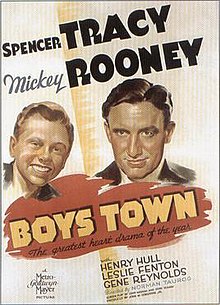Boys Town (film)
| Boys Town | |
|---|---|

Theatrical release poster
|
|
| Directed by | Norman Taurog |
| Produced by | John W. Considine Jr. |
| Written by |
Dore Schary Eleanore Griffin John Meehan |
| Starring |
Spencer Tracy Mickey Rooney Henry Hull |
| Music by | Edward Ward |
| Cinematography | Sidney Wagner |
| Edited by | Elmo Veron |
| Distributed by | Metro-Goldwyn-Mayer |
|
Release date
|
|
|
Running time
|
96 minutes |
| Country | United States |
| Language | English |
| Budget | $772,000 |
| Box office | $4,058,000 |
Boys Town is a 1938 biographical drama film based on Father Edward J. Flanagan's work with a group of underprivileged and delinquent boys in a home that he founded and named "Boys Town". It stars Spencer Tracy as Father Edward J. Flanagan, and Mickey Rooney with Henry Hull, Leslie Fenton, and Gene Reynolds
The film was written by Dore Schary, Eleanore Griffin and John Meehan, and was directed by Norman Taurog.
Legendary MGM Studio head Louis B. Mayer, who was a Ukrainian-American Jew known for his respect for the Catholic Church, later called this his favorite film of his tenure at MGM.
Although the story is largely fictional, it is based upon a real man and a real place. Boys Town is a community outside of Omaha, Nebraska. In 1943 Boys Town adopted as its image and logo a sculpture of a boy carrying a younger boy on his back, captioned "He ain't heavy, Father ... he's my brother." In 1941, MGM made a sequel, Men of Boys Town, with Spencer Tracy and Mickey Rooney reprising their roles from the earlier film.
A convicted murderer asks to make his confession on the day of his execution. He is visited by an old friend, Father Flanagan (Spencer Tracy) who runs a home for indigent men in Omaha, Nebraska. When the prison officials suggest that the condemned man owes the state a debt, Father Flanagan witnesses the condemned man's diatribe to prison officials and a reporter that describes his awful plight as a homeless and friendless boy who was a ward in state institutions. After the convicted man asks the officials to leave, Father Flanagan provides some comfort and wisdom. On the train back to Omaha, Father Flanagan is transformed in his humanitarian mission by revelations (echoed in the words) imparted by the condemned man's litany of hardships experienced as a child without friends or family as a ward of the state.
...
Wikipedia
